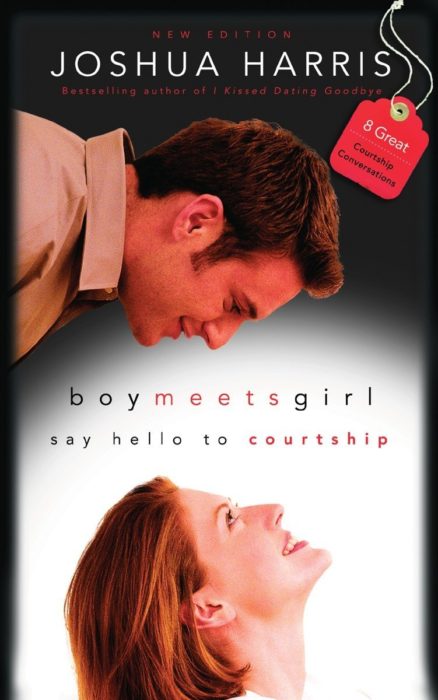It’s Legalistic to Punish Joshua Harris for the Sins of ‘The Purity Culture’
That Joshua Harris article took off. I thought it said all I wanted to say.
Still, in light of another plot twist in the case of The People vs. Joshua Harris, it’s worth revisiting this point from that piece. Speaking in general of young Christians who believe they’re suffered from the Church, I suggested that they tend to:
empathize with and effectively to use professing victim classes as an “avatar,” or surrogate victim, to express their own unresolved conflict with evangelical institutions, families, or churches. Similarly, they must cast “the evangelical church” as a surrogate oppressor, playing the role of the churches, institutions, or even family members who have caused the young Christian perceived harm in the past.
Joshua Harris, with his expressed “regret” to “the LGBTQ+ community,” seemed to be another example of this surrogate victim-casting.
At the same time, many people are doing a similar thing to Harris. They’re casting him as the surrogate “oppressor,” and blaming him for the sins of people whose bad teachings or spiritual abuse they have suffered.
Columnist David French: Joshua Harris = that bad youth pastor I knew in that church that one time
In point 8 of Friday’s article, I issued some mild challenges to those who accused Harris’s works of solely assassinating their love lives.1
But just today, none other than National Review’s (and Time‘s) David French stomped these critics’ sour grapes into a cheap whine.
In Whither Evangelical Purity Culture? Thoughts on the Legacy of a Lost Pastor, French summarizes I Kissed Dating Goodbye. Then he takes a drastic swerve into some real personal pain:
[The book] was part of the foundation of Evangelical “purity culture,” and it revolutionized parenting and dating for countless Christian parents and families.
I remember it well. I was a youth pastor for a few memorable months at the height of the courtship craze. The year was 1998, I was a youth volunteer at a small church in Georgetown, Ky., when our youth pastor left. . . . The youth ministry had gone all-in on purity culture. The previous youth pastor had even declared “no date ’98,” placing a moratorium on every kid in the youth group: not even a single date for the entire year. . . .
Did you catch the swerve? French only briefly mentions Harris’s book and its setting. Then, French immediately veers to a describe a bad personal situation in a church where he ministered. Yes, he accurately describes the bad results that many Christians have seen, when bad teachers make “purity” into an idol, ignore or assume the gospel, and keep blithely ignorant while the kids flail about in failure.
However, French does not even mention if this bad youth pastor he knew had even read I Kissed Dating Goodbye, or whether the pastor’s bizarre beliefs were influenced by the book. There’s no nuance, no attempt to show the consequence.
French simply presumes: Joshua Harris = “the courtship craze” = “purity culture.”
If we really believe in grace, let’s show some to Joshua Harris
Other Joshua Harris critics assume and do not prove this equivocation. They do not actually engage with what Harris wrote in his first book. (Which had good parts and poor teachings side-by-side.)
They also do not separate Harris’s actual ideas, from the notions of some dysfunctional parent or youth pastor who banned dating.
Perhaps strangest of all, French (and other, less-formal Harris-hatewatchers) act as though Harris simply vanished off the scene, between 1997 (IKDG‘s publication year) and the year 2019.
Here, French seems unaware of Harris’s followup book, the much more rational Boy Meets Girl: Say Hello to Courtship (2000).
He doesn’t heed the fact that Harris spent years as a trainee pastor, and then pastor, for many years (in an interesting denominational arrangement). And to top off the strangeness, did French utterly miss the fact that Harris, pre–apostasy declaration, was already out and about recanting his own message? No, not just last year, but as far back in 2005 when Harris preached a sermon called “Courtship, Schmourtship” and took other steps to resist the legalism?
See here. I won’t defend Harris’s previous bad teachings. In fact, I might write about book messages that were directly unbiblical and harmful. And I certainly won’t defend the motive or plainly absurd “regret” tone of Harris’s apostasy statement.
However, even if Harris never took these steps, does it make any sense to hold him liable for that one bad youth pastor?
Or that manipulative, spiritual abusive parent?
Or that jerk of a patriarchalist father, who refused to give that good homeschooled boy a courtin’ chance with his daughter?
If we claim to be such fans of grace, why would we speak with such legalistic condemnation again one man? As if to make that one man bear the sins of an entire “purity culture”?
Let’s not blame the book author for the sins of his fans. And, literally, for God’s sake, don’t lump everything bad about a “purity culture” into one presumed ball of gross, and then throw that on top of the head of one poor wandering soul. You wouldn’t want to be associated with the sins of your people. In fact, this kind of association-with-evil is exactly what happens when bad youth pastors declare that all dating is bad.
I’ve also heard accounts of dysfunctional families, churches, youth groups, etc. that turned “purity” into idols apart from the grace of Jesus Christ. But by this same grace we ought not punish authors for the sins of their fans! Joshua Harris ≠ that legalistic youth pastor. 3/
— E. Stephen Burnett (@EStephenBurnett) July 29, 2019
Addendum: ‘We just want That One Person to be held accountable’
 My friend Frank Sun made this highly astute comment.2
My friend Frank Sun made this highly astute comment.2
I feel bad for Harris in many ways. In the grand scheme of things, his own role in the whole “purity culture” was pretty small. At first, all he did was write a book with some bad teachings in it. Sure, it had a bit of a provocative title, but still, at one point, I Kissed Dating Goodbye was only a single book, among many on shelves, trying to offer love advice to Christians, as prone to ultimately being ignored as any other.
The “culture” only came about because of countless other people who latched onto that book, using it and twisting its message in order to gradually form what could be called a culture. From there Harris was basically sucked into the culture as its figurehead, when he was, as I see it, wholly unprepared and unwilling to be such. In fact, it felt like to me that, for all that the culture practically idolized him, his own voice in the culture felt very small; it almost felt like people knew him more just for “starting” the movement than for the specific teachings in his books.
(I wonder how many even knew that he had re-written IKDG with more moderate teachings.)
In the end, there are so many forces at work behind purity culture, just as there are with any other cultural movements.
Unfortunately, people want to be able to blame a specific name and face for their problems. They don’t like having to spread that blame over a nebulous “culture” of people that they can’t hold accountable.
—Frank Sun
Unfortunately, people want to be able to blame a specific name and face for their problems. They don’t like having to spread that blame over a nebulous “culture” of people that they can’t hold accountable. So the unwilling figurehead gets dragged out into the streets and beaten as he’s paraded down for all to see, while the many others who contributed in small ways watch quietly in their homes.
Unfortunately, this is the way of the world: pin the blame on a specific name and face and hope that makes all your problems go away. Whether it’s an author, actor, or president, we just want That One Person to be held accountable for our problems. And when That One Person does leave but the problems continue, we just find the next person to blame.
My friend Adam Graham also remarks:
When I was 15 and a half, someone gave my parents an audio cassette series on courtship the year before I Kissed Dating Goodbye was published. Harris didn’t start the fire.
- Today The Babylon Bee stung ruthlessly with a satirical version of the same challenge. ↩
- I’ve edited the comment only a little. ↩














I don’t have much opinion on Harris as a person or anything, but it kind of sickens me that people sit there and only blame others without taking much accountability for what they’ve chosen to believe.
Yeah, it’s frustrating when people give bad advice, and people should take SOME accountability for the advice they give, but often enough, people give that advice with some level of good intentions. Not always, obviously, because some people are horribly dishonest. But…I dunno. Isn’t it obvious that everyone is going to give (extremely) bad advice sometimes, regardless of their intentions?
Like, to a very large degree, it’s OUR responsibility to evaluate the advice we receive and apply it accordingly. And, more importantly, to think carefully about important decisions before moving forward.
Maybe people following the courtship advice were just as in the wrong and naive as the people writing that advice. Live and learn from the experience, instead of obsessively casting blame. Some accountability needs to be expected of bad advice givers, but people also need to question why they’re so careless in following other people’s advice in the first place.
[…] It’s Legalistic to Punish Joshua Harris for the Sins of ‘The Purity Culture’ | E. Stephen Burnett, Jul 29 […]
Josh Harris wouldn’t have become so popular if this junk hadn’t already been floating around the culture. He just codified an extreme version that seemed more earnest because it was so extreme. Yeah, a lot of angry talk about purity culture revolves around Josh Harris because he is a convenient touchstone about it. But while Josh is a victim, he’s also an oppressor at the same time.
He benefited monetarily and socially from all this noise. And while he might have made sounds about pulling his books from print, did he actually do anything concrete until very, very recently? He might have had his doubts, but that thing was still circulating in print for nearly two decades. From what I hear, Boy Meets Girl is NOT actually that much better. Both now and then, he doesn’t seem to have done much besides make mouth-noises about helping victims of the attitudes pushed by his rhetoric. Who has he helped with direct actions? (I am genuinely interested to know.) He tried making a documentary about his change of mind, but it didn’t center the victim’s experiences and feelings, it centered HIS. Even his new secular business is making him into a supposed authority based on his experience that stems from IKDG.
Honestly, I’m waiting for him to just f**k off into relative obscurity, and a lot of my further opinion will depend on if he remains f**ked off.
This here’s just a rant that has already been challenged by the original article. Perhaps we’re experiencing a time-space anomaly: I write the article, as a consequence of reading your rant, and directly rebutting these kinds of rants, but in fact you wrote the rant after I shared the article. To sum up, nothing in your rant actually engages with the article, and happens to provide an exact example of the kinds of nasty legalistic attitudes that I’m hoping to challenge.
So my attitude is legalistic, but yours, where he has to jump through a different number and kind of hoops to be socially acceptable again, is not. Mmmkay. Maybe the only hoop you care about him jumping through is to think that gay people are icky again, but that’s not legalistic somehow, right.
“Legalism” is a well-established pattern of behavior that occurs within Christianity (and other belief systems as well in fact) in which rigid rules are laid down for people to obey that one must follow to obtain favor with God. Sometimes the rigid rules are linked to the very means to obtain salvation, but other times are applied to people to tell them how to live on a daily basis. I tend to restrict my own use of “legalism” for the type that makes rule-keeping a requirement for eternal salvation and prefer “legalistic” for teachings that don’t say following rules gets you to heaven, but still drop a bunch of rules on people.
Legalism tends to make people feel they have earned their status with God. And legalism also makes it super easy to identify “sinners” (do X and you are one, always, circumstances don’t matter) because it leaves no room at all for “what may be a sin for me may not be a sin for you”–even though the individuality of sin (within limits) is a New Testament concept. So legalists are often harsh and judgmental.
However, being harsh and judgmental is not the definition of legalism or even being legalistic. One could propose rules and be strict about them and NOT harshly judge others who don’t follow those rules. Sure, such an attitude is relatively uncommon, especially in Evangelical circles, but it represents how I think most monks live. Or most Amish people (to give a couple of examples).
Purity culture, which I took at the time non-legalistically as simply a good idea that people try to avoid sex before marriage, others took as rules to keep, period, because. Some applied Harris’s book as a kind of guideline to harsh rules they’d establish. You are right, that was their own fault, not Harris’s per se.
But you are wrong to say Notliea embraces “nasty legalistic attitudes.” Notliea, who has commented on Speculative Faith for long enough for both you and I to know her to a fair degree, might be accused of a form of social justice legalism, but certainly does not espouse any kind of Christian legalism. She does NOT propose rule-keeping for the purpose of obtaining favor with God.
Her attitude is simply judgmental and angry. Proof that legalism itself is not the only cause of people being mean-spirited. Nasty, but not legalistic.
Notleia, I’m going to confront you here on your willingness to condemn Harris for making money off selling a book that restricted sexuality but your absolute silence about the billions being made on sexually-exploitative pornography. Perhaps you do rail about porn too, elsewhere, but I’ve never heard you do so.
Purity culture made relative pennies compared to truckloads of cash that porn drags in. Some porn is the product of literal human slavery.
Maybe some of your ire ought to be turned on people who are no-kidding oppressing women instead of tilting at windmills of supposed sins of Evangelicals…
Okay, obligatory anti-porn statement: Porn bad because exploitation and continuation of misogyny and etc.
But just because I’m not forced to wear a burqa or whatever doesn’t mean I have no place to criticize the bullcrap I do have to put up with. If you can’t criticize something because someone else has it worse, then all white dudes should shut up forever, but I do not expect that of other people.
Do you even go to a church at all? You did once upon a time, but I’m not really sure that you personally are putting up with a lot of the “bullcrap” you complain about. If any.
Re anyone complaining about anything, yeah I agree having privilege should cause people to complain less but doesn’t oblige people to never complain about anything, ever.
Also on the same topic “all white dudes” would in theory include those sold as sex slaves (some sex slaves are male, though it’s a minority and many modern slaves are white), those born with congenital conditions like having no arms and no legs, and those who have been through various forms of personal hell, like literal torture. Perhaps you should re-think that “all.”
Oh, I didn’t check on this thread for awhile.
I work pretty much every Sunday lately, so no, I don’t even make it to the Lutheran church a few blocks away. It’s kinda weird to live in Lutheran country rather than Baptist country, but honestly I’m tired of (Southern) Baptists.
But yes, I definitely put up with less sexist bullcrap than I used to, mostly because I made an effort to get away from it. Like not hanging out with Church of Christers anymore. Or Southern Baptists.
Why would it be a bad thing to avoid putting up with bullcrap? But there’s still some weird, semi-creepy stuff I have to put up with anyway, like when Patrick at my local Arby’s tried to be…charming, I guess, and called me lovely and asked for a smile. I gave him something more like the awkward seal meme.
[…] David French is a notable exception. I don’t always agree with David French, especially when he seems to paste his own pro-ministry experience atop more-nuanced issues. French, however, does represent the kind of broad qualifications and experiences that the better […]